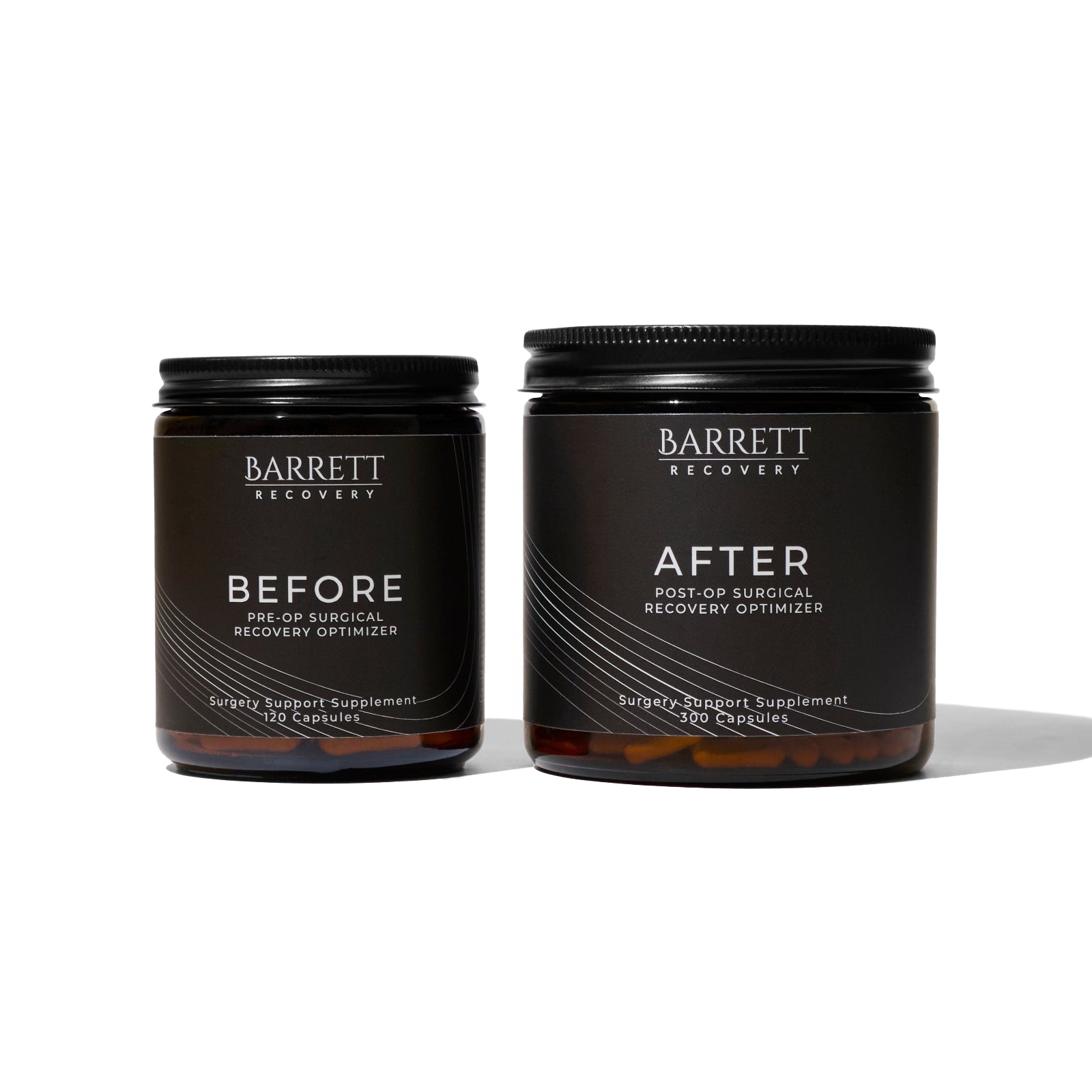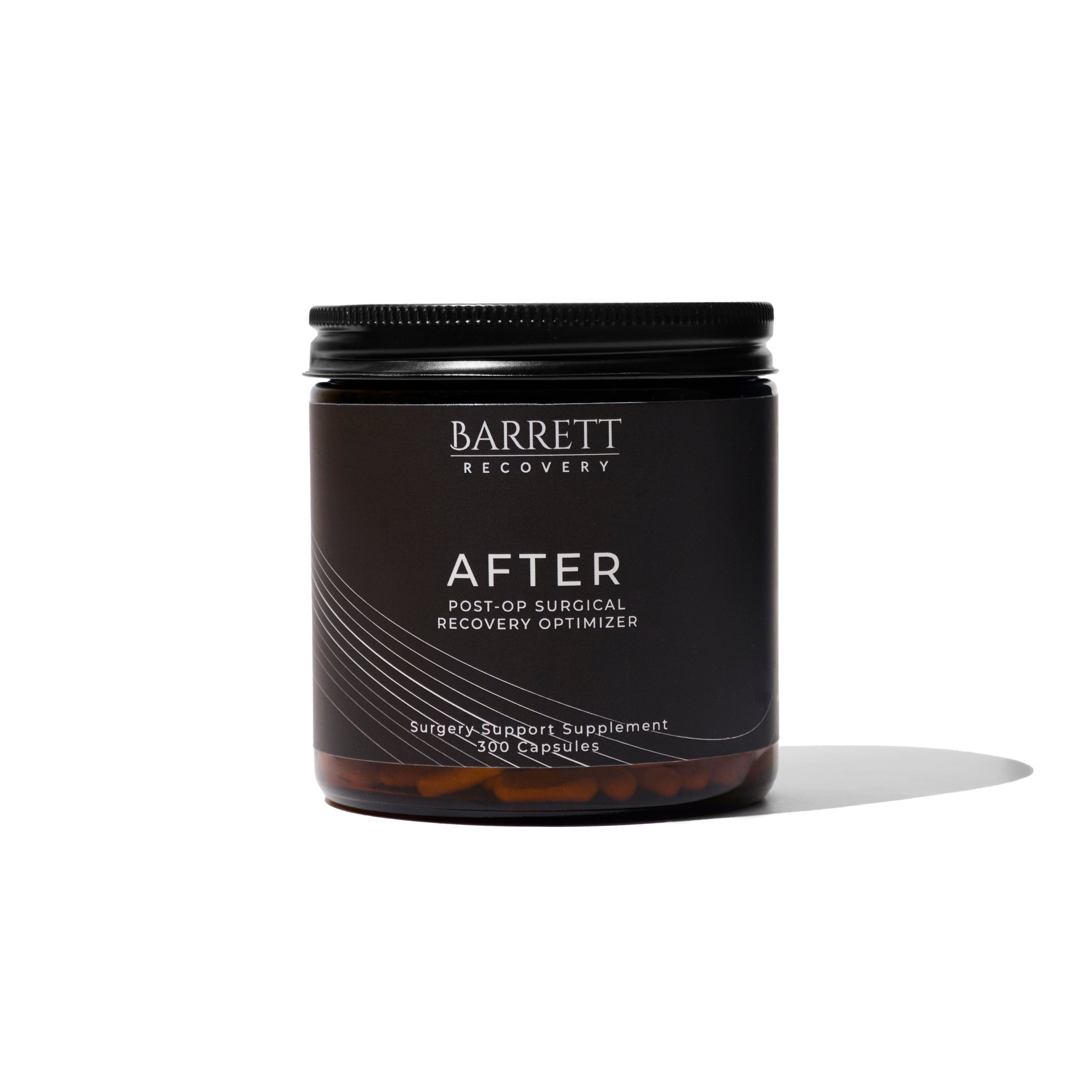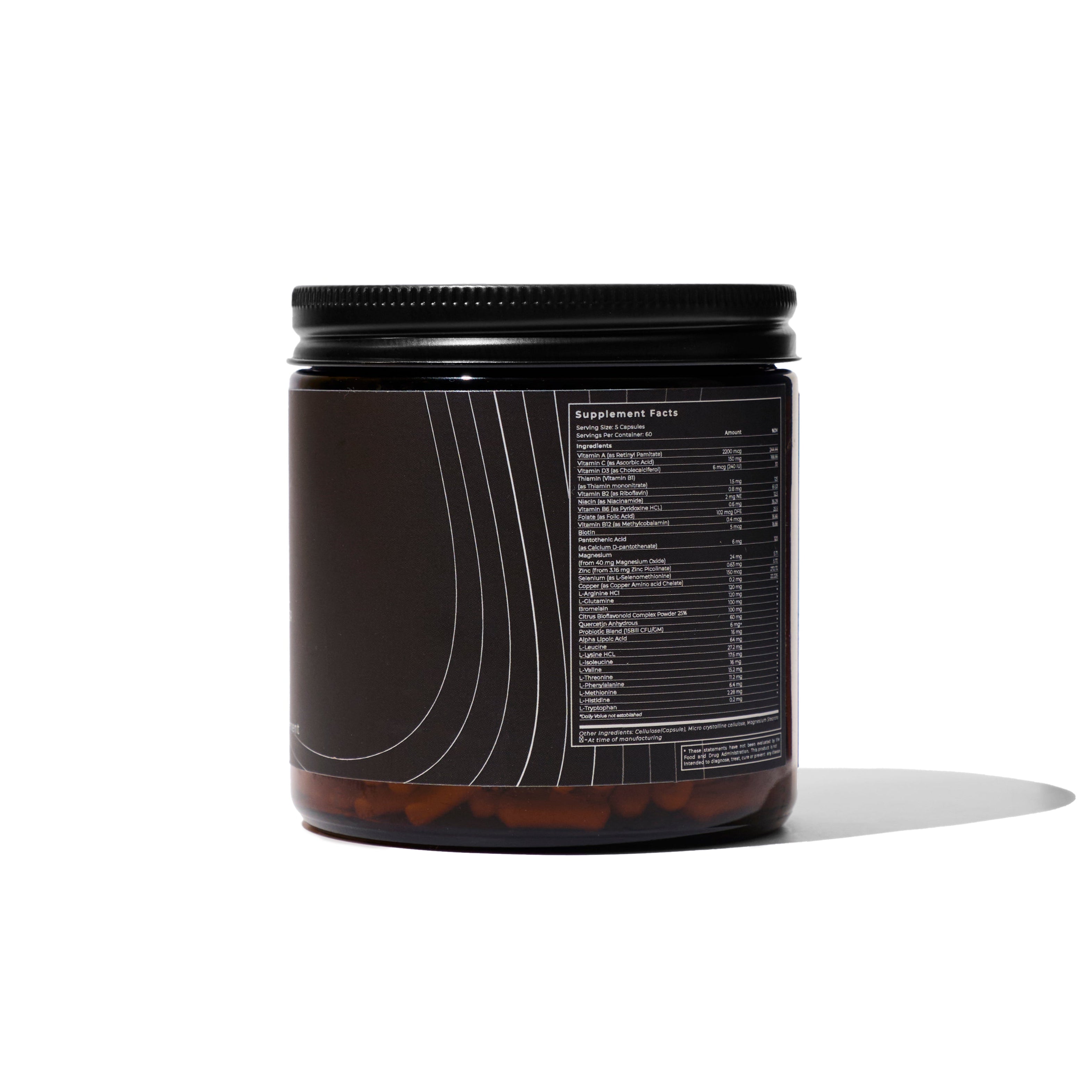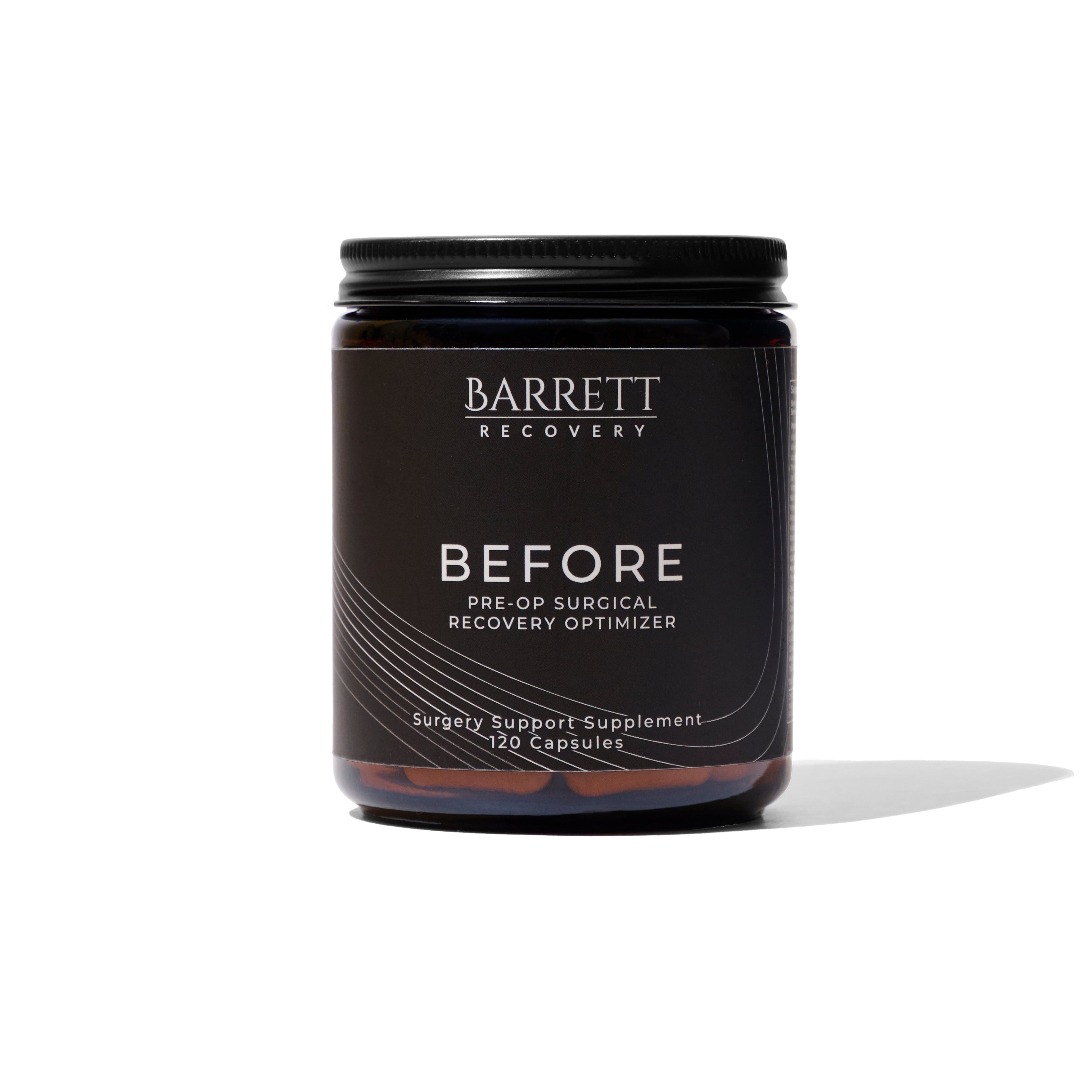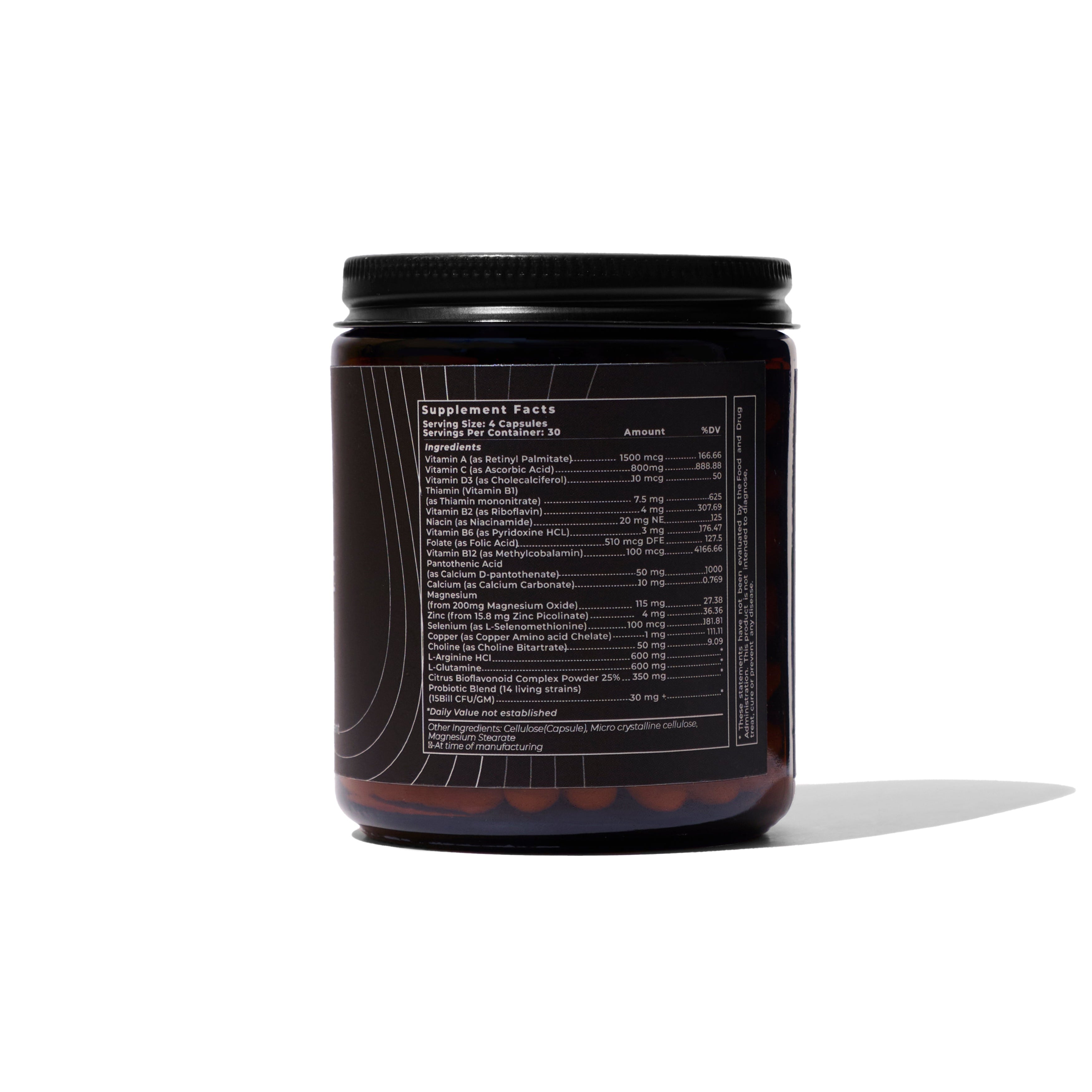BEFORE:
Vitamin A (as Retinyl Palmitate): Vitamin A is required in the formation of skin and bones. It assists in immune system support, cell growth, and the production of blood vessels.
Vitamin C (as Ascorbic Acid): Vitamin C is a naturally occurring water-soluble vitamin required for collagen production. It’s also an antioxidant that helps the body regenerate other antioxidants in the body.
Vitamin D3 (as Cholecalciferol): Cholecalciferol is a type of Vitamin D found in animal-based foods or develops in the skin after UV light exposure, that helps the body absorb calcium and phosphorus and can be used as an anti-inflammatory.
Thiamin (Vitamin B1) [as Thiamine mononitrate]): Thiamin, a form of vitamin B1, supports the growth and function of the body’s cells. Small amounts of thiamin occur naturally in the liver, but additional supplements are recommended to reap the full benefits of vitamin B1.
Vitamin B2 (as Riboflavin): One of the eight types of vitamin B, riboflavin helps the body convert food into fuel to give us energy. It supports metabolism, the production of antibodies, and cellular respiration.
Niacin (as Niacinamide): Niacinamide is a form of vitamin B that can be found in food but is often taken as a supplement as an anti-inflammatory for the skin. Dermatologists recommend it to treat acne.
Vitamin B6 (as Pyridoxine HCL): Although vitamin B6 is not naturally produced in the body, ingesting it through food or supplements helps create red blood cells and neurotransmitters.
Folate (as Folic Acid): Folate/folic acid is a type of vitamin B9 and is one of the most common health supplements, as it’s an essential nutrient. Folic acid is the synthetic form of vitamin B9 and promotes cell growth and function.
Vitamin B12 (as Methylcobalamin): A naturally occurring form of vitamin B12, methylcobalamin is a vital nutrient that supports brain function, nerve tissue, and red blood cells.
Pantothenic Acid (as Calcium D-pantothenate): Pantothenic acid is a variety of vitamin B5 that helps the body break down fats and carbohydrates into energy.
Magnesium (200mg Magnesium Oxide): One of the most abundant minerals in the human body, magnesium oxide is a well-known supplement used to promote muscle and nerve function as well as energy production.
Zinc (15.8mg Zinc Picolinate): Though the body only needs trace amounts of it, zinc is a mineral crucial in creating DNA, thus assisting with healing damaged tissue. It’s also proven to support a healthy immune system.
Selenium (as L-Selenemethionine): Like zinc, selenium is a trace mineral used in small amounts to support cellular signaling and control.
Copper (as Copper Amino Acid Chelate): More commonly known as a malleable metal, copper has numerous health benefits, including supporting the body’s production of red blood cells and collagen and having strong anti-bacterial properties.
L-Arginine HCl: L-Arginine HCl is an amino acid in meats, fish, and nuts that helps the body build protein. The body naturally produces L-arginine HCl, but increasing intake through supplements or diet helps to repair damaged tissue.
L-Glutamine: Glutamine is the most abundant naturally-produced amino acid in human blood. It’s necessary for the production of protein and is transferred via blood to different organs.
Citrus Bioflavonoid Complex: Citrus bioflavonoids are compounds found specifically in the pulp and rind of citrus fruits. Though they aren’t technically a vitamin or mineral, these compounds improve the skin’s healing ability.
Probiotic Blend (14 living strains): In order to operate properly, the gut needs healthy bacteria and yeast. Probiotics provide live organisms that promote digestion, immune support, and the production of naturally occurring vitamins.
AFTER:
Vitamin A (as Retinyl Palmitate): Vitamin A is required in the formation of skin and bones. It assists in immune system support, cell growth, and the production of blood vessels.
Vitamin C (as Ascorbic Acid): Vitamin C is a naturally occurring water-soluble vitamin required for collagen production. It’s also an antioxidant that helps the body regenerate other antioxidants in the body.
Vitamin D3 (as Cholecalciferol): Cholecalciferol is a type of Vitamin D found in animal-based foods or develops in the skin after UV light exposure, that helps the body absorb calcium and phosphorus and can be used as an anti-inflammatory.
Thiamin (Vitamin B1 [as Thiamine Mononitrate]): Thiamin, a form of vitamin B1, supports the growth and function of the body’s cells. Small amounts of thiamin occur naturally in the liver, but additional supplements are recommended to reap the full benefits of vitamin B1.
Vitamin B2 (as Riboflavin): One of the eight types of vitamin B, riboflavin helps the body convert food into fuel to give us energy. It supports metabolism, the production of antibodies, and cellular respiration.
Niacin (as Niacinamide): Niacinamide is a form of vitamin B that can be found in food but is often taken as a supplement as an anti-inflammatory for the skin. Dermatologists recommend it to treat acne.
Vitamin B6 (as Pyridoxine HCl): Although vitamin B6 is not naturally produced in the body, ingesting it through food or supplements helps create red blood cells, which transport oxygen throughout the body.
Folate (as Folic Acid): Folate/folic acid is a type of vitamin B9 and is one of the most common health supplements, as it’s an essential nutrient. Folic acid is the synthetic form of vitamin B9 and promotes cell growth and function.
Vitamin B12 (as Methylcobalamin): A naturally occurring form of vitamin B12, methylcobalamin is a vital nutrient that supports brain function, nerve tissue, and red blood cells.
Biotin: Biotin is the popular name for vitamin B7 and assists in converting food into energy, and keeps the hair, skin, eyes, and nervous system healthy.
Pantothenic Acid (as Calcium D-pantothenate): Pantothenic acid is a variety of vitamin B5 that helps the body break down fats and carbohydrates for energy.
Magnesium (40mg Magnesium Oxide): One of the most abundant minerals in the human body, magnesium oxide is a well-known supplement used to promote muscle and nerve function as well as energy production.
Zinc (as Zinc Picolinate): Though the body only needs trace amounts of it, zinc is a mineral crucial in creating DNA, thus assisting with healing damaged tissue. It’s also proven to support a healthy immune system.
Selenium (as L-Selenomethionine): Like zinc, selenium is a trace mineral used in small amounts to support cellular signaling and control.
Copper (as Copper Amino Acid Chelate): More commonly known as a malleable metal, copper has numerous health benefits, including supporting the body’s production of red blood cells and collagen and having strong anti-bacterial properties.
L-Arginine HCl: L-Arginine HCl is an amino acid found in meats, fish, and nuts that helps the body build protein. The body naturally produces L-arginine HCl, but increasing intake through supplements or diet helps to repair damaged tissue.
L-Glutamine: Glutamine is the most abundant naturally-produced amino acid in human blood. It’s necessary for protein production and is transferred via blood to different organs.
Bromelain: Promoted as an anti-inflammatory supplement, bromelain is produced in the fruit and stem of pineapple plants. Bromelain reduces pain and swelling after surgery.
Citrus Bioflavonoid Complex: Citrus bioflavonoids are compounds found specifically in the pulp and rind of citrus fruits. Though they aren’t technically a vitamin or mineral, these compounds improve the skin’s healing ability.
Quercetin Anhydrous: A natural pigment derived from numerous types of grains, fruits, and vegetables, quercetin anhydrous is one of the most abundant antioxidants in the human diet. It helps the body fight off free radical damage.
Probiotic Blend: In order to operate properly, the gut needs healthy bacteria and yeast. Probiotics provide live organisms that promote digestion, immune support, and the production of naturally occurring vitamins.
Alpha Lipoic Acid: An antibiotic made by the body, alpha lipoic acid is found in every cell and helps turn glucose (sugar) into carbon dioxide (energy). It’s both water and fat-soluble and assists the body in attacking waste during cellular respiration.
Amino Acids: All living things need special proteins called amino acids to function. Amino acids form various long chains with specific sequences to create new, different types of proteins. They help make proteins that break down food, repair body tissue, make hormones, and sustain a healthy immune system, among other things. Essential amino acids are those that are not produced naturally in the body, though our bodies need them to function, and must be ingested through diet or supplements. AFTER includes nine essential amino acids:
L-Leucine: specifically helps heal the skin and bones.
L-Lysine HCL: often used for medical purposes, such as cold sores, canker sores, and diabetes. It also has anxiety-reducing and collagen-building qualities.
L-Isoleucine: assists in the production of hemoglobin. It’s known to decrease the healing time for injuries.
L-Valine: promotes muscle growth and boosts the immune system.
L-Threonine: a key component of elastin and collagen. Elastin and collagen give the skin a youthful, firm appearance.
L-Phenylalanine: helps the body produce Epinephrine, norepinephrine, and dopamine, which all support healthy brain function.
L-Methionine: protects damaged tissue by acting as an antioxidant.
L-Histidine: assists in repairing damaged tissue and creating new, healthy tissue.
L-Tryptophan: a dietary source of Vitamin B3 and helps create serotonin, known to support several body functions.
